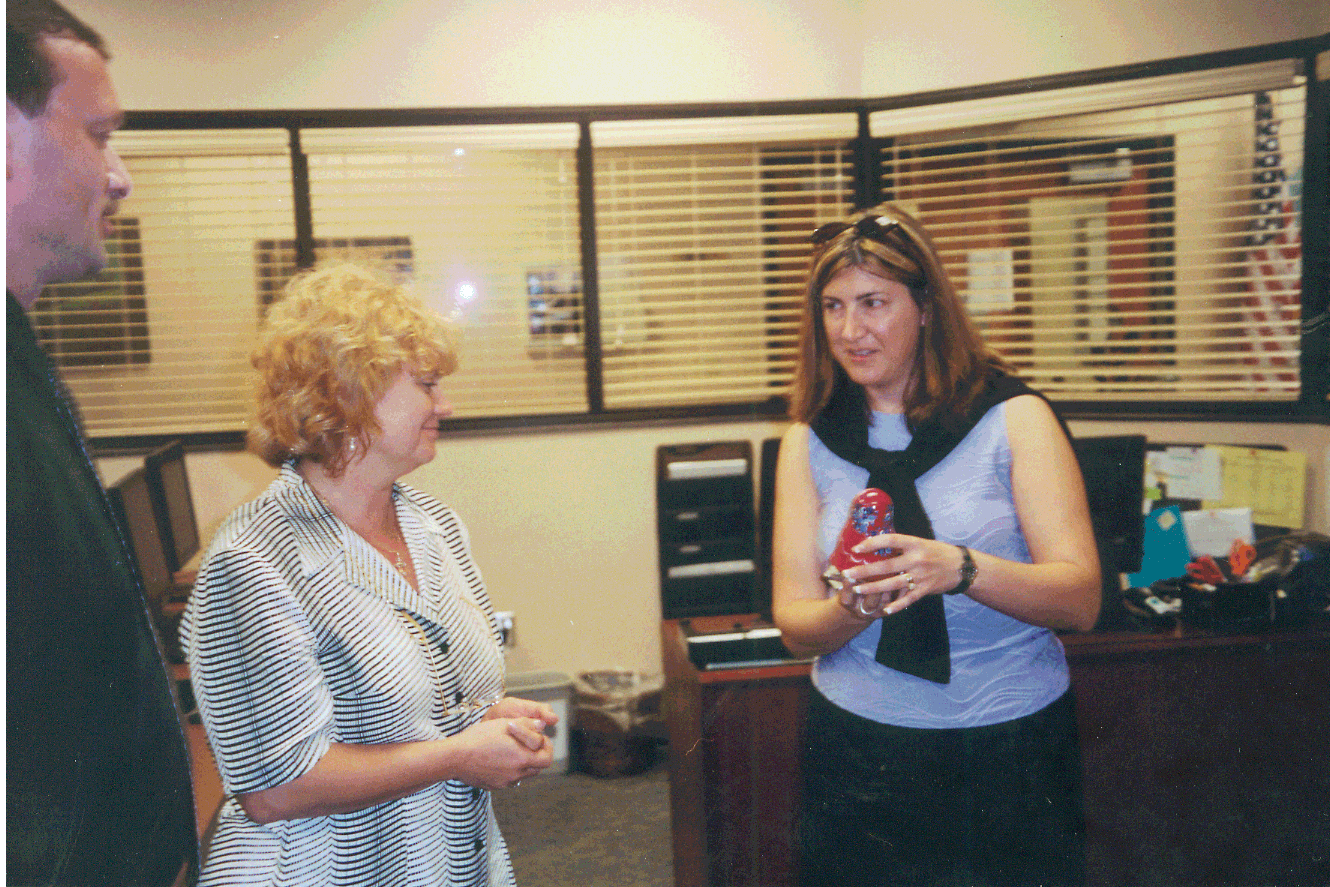top of page
Education
Fort Gay
A team of 8 educators and community leaders from Fort Gay traveled to Korolev, Russia for an eight day educational exchange.
The Russia School in America was the catalyst that brought the entities together. Students and teachers from Korolev were hosted by educators and citizens from Ft. Gay in Wayne County. Simultaneously, Ft. Gay Elementary was very involved in designing their School to Work Site Plan and concentrating on the technology section. Everything just seemed to click. The questions began: Russia has a 98% literacy level. Without a plethora of hardware, they are still world leaders in developing software. What are they doing in their schools to cause this success? What can we learn from their educational system? What can they learn from our system? How can we join the best of both systems so that our children benefit from the combined knowledge

Participants take a break after a work session
Led by the principal, JoAnn Hurley, a team of 8 educators and community leaders from Ft. Gay left for Korolev for an eight day educational mission. Joining them on January 8, 1998 were Jean Cary Davis and Virginia Simmons from the State Department of Education and Rick Remish from Senator Rockefeller's Washington office.
Ludmilla Krasneva, Director of Social Reform & Labor
Russian Federation visits Foundation

Virginia Simmons meets with Luidmila Krasneva, and Alexey Tcheremnykh

Ludmilla and Virginia meeting with Horry County Board of Educaton



Alexey and Luidmila meet with Mark McBride, Mayor of Myrtle Beach
Horry Co. Board of Education members enjoy Luidmila's talk during lunch

Luidmila presents Russian gifts to Mayor McBride
Luidmila addressing the Board of Education members

Luidmila, Alexey and Dave McChesney

Dr. Ron Ingle, President of Coastal Carolina University admires his Russian gift

Alexey and Luidmila present their information at Coastal Carolina University

< Luidmilla discussing with Coastal Carolina University distance learning
Moscow State Social University
Cooperation with Moscow State Social University On December 17, 1996, Dr. Henry Marockie, State Superintendent of Schools, signed an agreement of cooperation with leaders representing Moscow State Social University.
This University was started in 1992 under the direction of Boris Yeltsin and with his wife as the President of the Board of Directors. The University is seen as part of the "New" Russia and is important in the training of those who will be dealing with the new social order. The University officials contacted Alexey Cheremnykh about the possibility of working with West Virginia and in September met with Dr. Virginia Simmons concerning details of the exchange.
The group of 11 advanced students and two professors had an opportunity to view, first-hand, many of WV's social programs. Their visits in Charleston, Logan, Beckley and Morgantown (WVU) combined with home stays provided a well-rounded view of many of the programs that WV has to offer. Continued exchanges are planned through WVDE IHEs and other resources
Russia School in America
In 1992, a small community to community exchange took place between Parkersburg, West Virginia and Kaliningrad, Moscow Region, Russia. This exchange was perpetuated by a NASA teacher in space finalist and leadership in the Russian Space Agency. This exchange could have ended, as many do, as a nice time for the participants and sweet memories of learning about a new country that was formerly banned by the government.
Instead, something magical happened. This exchange exploded into a Foundation that has supported over 200 exchanges focusing on the area of education, business, culture and community. The exchanges have become progressively more involved and complex. The ultimate is now the exchange that no one in America has attempted, "The Russia School in America."
When the Russia School in America was first suggested, the site was considered and only one option was appropriate, West Virginia State College. The College had hosted The Governor's Honors Academy and had proven that it was a site that was compatible to accommodating high school students. In addition, Dr. Charlotte Giles, Dean, was an administrator who understood attention to detail. More importantly, Dr. Giles shared her warm heart in reaching out to help others and she had exhibited her ability to work with foreign students and educators. If the Russia School in America was to be successful, West Virginia State College needed to be the first site.
On October 5, 1997, forty-one Russian students and 10 Russian teachers arrived at West Virginia State College ready to embark on this new adventure. The students ranged in age from 12 to 17 and continued with their classes that had begun in Russia. Besides Chemistry, Biology, Geography, History, Russian, Mathematics, Physical Education and other Russian subjects, the students participated in American Cultures, English As a Second Language and Computers. They visited schools, glass plants, historical sites, hospitals, cultural presentations, banks, Halloween parties, Thanksgiving dinners and generally learned about America life - first-hand. Their happiest moments were spent in the homes of their West Virginia families.
The success of this project can be judged by the products - the products for this exchange are the academic challenges and learning of the students. This learning was exemplified during the last week when the students presented their research reports that had been written in English and Russian. The students were also required to answer questions in English and to generally discuss their academic studies in America.
The results were astounding. According to the students and teachers, the students learning far exceeded that which would have occurred in Russia. The gains in the academic arena were complemented with the gains in the areas of American Culture and English. It would have been impossible to absorb this information unless the students could absolutely be immersed in the culture. The West Virginia families who opened their homes and their hearts to these students have now opened a window of global knowledge for themselves. The elation of success that we all feel can be surmised in one statement, "The next group will arrive in February."
bottom of page
